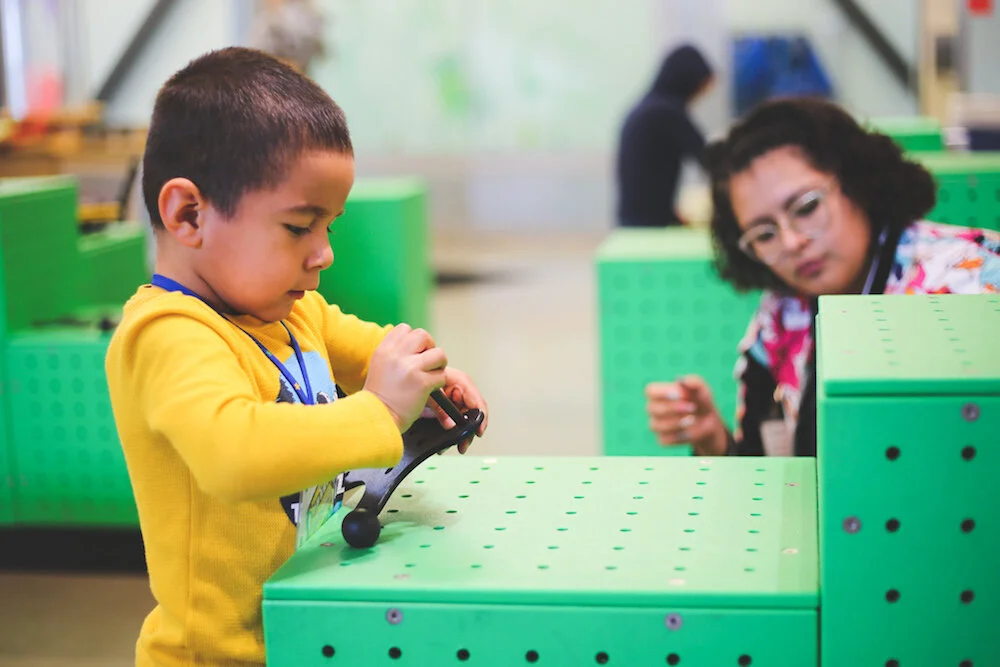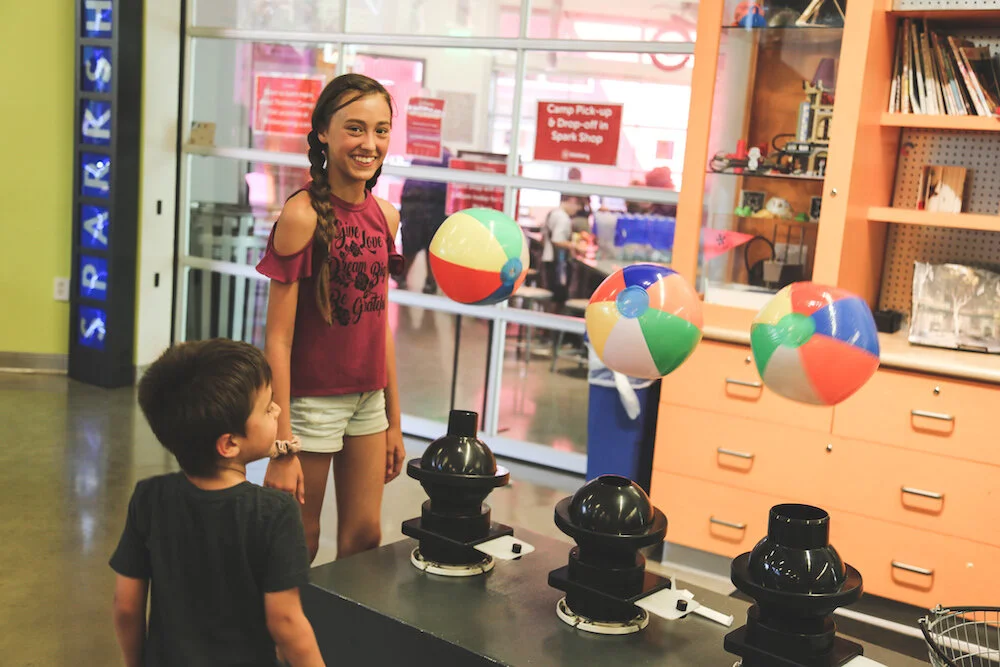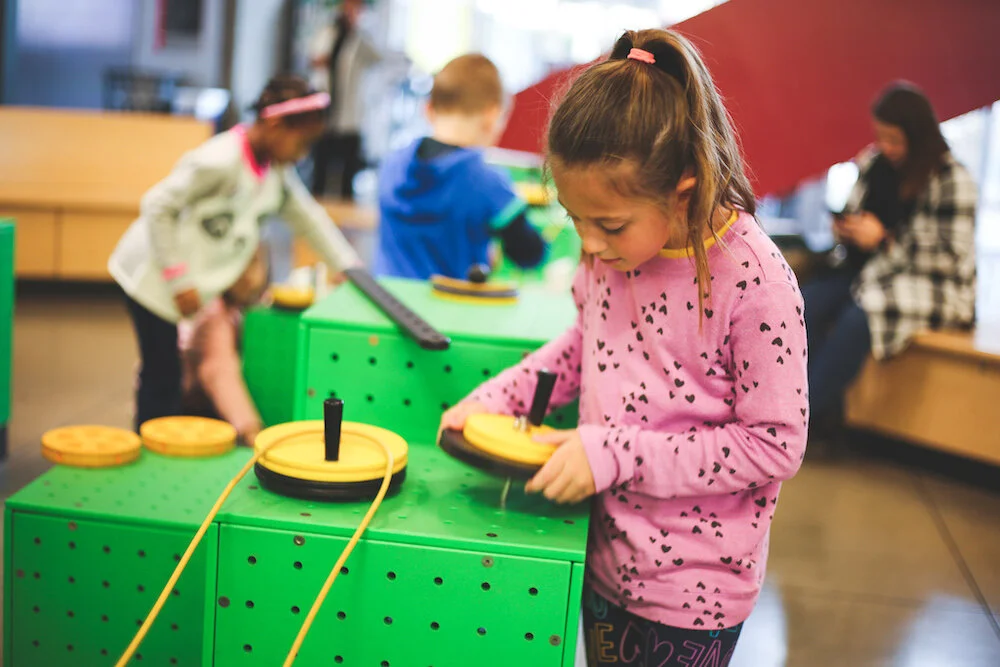Thinkery Connect: A Museum-University-Community Research Partnership
Thinkery Connect is a museum-university-community partnership between Austin’s children’s museum, Thinkery, and The Center for Applied Cognitive Science at The University of Texas at Austin Department of Psychology (PI Professor Cristine Legare). The objective of this partnership is to translate best practices from learning sciences into museum operations. Our educational philosophy is grounded in play-based, inquiry-rich learning experiences. Our approach to exhibit development is to design visitor experiences that encourage STEM “Habits of Mind” such as critical thinking, systematic exploration, resolute behavior, hypothesis-testing, experimentation, and trouble-shooting. These skills are critical to early STEM learning as well as school readiness more generally.
Our research partnership endeavors to enhance caregiver and child STEM learning experiences and support STEM Habits of Mind both inside, by designing, developing, and testing museum exhibits, and outside the museum walls, with curated educational resource material and educational programs. Focusing on STEM Habits of Mind that support school readiness skills can help communities better prepare children for school and set the foundation for lifelong learning. Thanks to generous funding from IMLS, we have constructed Thinkery Connect Headquarters (HQ) which allows us to 1) conduct research on caregiver and child interaction and learning, 2) evaluate visitor experience, 3) prototype exhibit design features and modifications, and 4) collaborate with community partners throughout the city and the state to support early childhood education and development.
Our research interest centers around what motivates and what constrains children’s early scientific reasoning—and how this might link to later science understanding. Two components of children’s natural curiosity are exploration and explanation, which include their tendencies to explore causal connections through play and to explain unexpected outcomes. Our research has demonstrated that unexpected or anomalous events are powerful triggers for explanatory reasoning. Children try to explain unexpected phenomena and they explore causal connections through play.
Our current research examines how children’s explanations and exploratory play behavior work in tandem to guide their causal learning and scientific reasoning, and the implications of this process for improving science education in schools and children’s museums. In ongoing work funded by the National Science Foundation, we are examining the implications of explanation and exploratory play for improving science education in preschools and children’s museums. We are currently examining how exploration and explanation emerge in children’s everyday interactions with family members in informal learning settings. Our research on family conversation and play in three children’s museums aims to bridge the disciplines of developmental psychology, science education, and informal learning to advance our understanding of early scientific thinking.
Thinkery Connect website →
Current Studies
Supporting Adults as Children’s Learning Facilitators: A Museum-University Research Partnership (2019-2021)
A 2-year Institute for Museum and Library Services (IMLS) funded project to formalize a decade long research relationship between Thinkery and Dr. Cristine Legare. Thinkery, in partnership with Dr. Legare, will design and develop a new Research Hub “exhibition” to increase public understanding and use of research-based strategies shown to enhance parent-child interaction and promote child learning. Despite Austin’s booming economy, it is among the most economically segregated cities in the country. As of 2018, 65% of children from low-income families in Travis County are not prepared for kindergarten, which creates obstacles for their futures. In response, a coalition of community stakeholders is working to transform the early childhood system in Travis County through the School Readiness Action Plan, spearheaded by United Way of Greater Austin. The plan defines a kindergarten-ready child as one who: 1) interacts positively with children and adults; 2) is curious and loves learning new things; 3) can focus and pay attention to adults, other children, a book or a task; 4) is generally happy and can manage his or her emotions; and 5) has age-appropriate language, thinking and physical skills. Research indicates that nurturing children’s curiosity is a specific strategy to help close the achievement gap. Furthermore, the American Academy of Pediatrics has affirmed the “power of play” as essential for children’s brain development and wellbeing. Thinkery’s educational approach aligns with these goals and centers on interdisciplinary STEAM experiences, play, and inquiry to inspire children’s learning. As an essential part of Austin’s learning ecosystem, Thinkery’s STEAM-focused, inquiry and play-based learning experiences aligns with our community’s efforts to serve the early learning community and, especially, underserved children.
This project has resulted in increased infrastructure and capacity through the design and construction of a 130 sq ft onsite research headquarters, Thinkery Connect Headquarters (HQ) with a dedicated Museum Researcher to translate empirical research and best practices to museum operations aimed at enhancing parent-child interaction and early learning. Thinkery Connect HQ will comprise of three sections, a “Research Hub,” for active research conducted by Professor Legare and her lab at UT, a “Community Resource Nook” with curated materials for parents and caregivers seeking resources on early learning and development, and a “Prototype Zone” for exhibit prototyping and evaluation. Research findings, including those tested at the Research Hub, come to life in the museum as bilingual exhibit prompt cards, signage, and exhibit modifications. These enhancements will support parents and adults as facilitators of children’s STEAM knowledge, inquiry-and play-based learning. Thinkery Connect HQ will be co-branded with exhibit components throughout the museum, visually signaling to visitors how research-based strategies woven throughout the museum integrate research and best practices in learning and cognitive development into Thinkery’s educational fabric.
Future Studies
Research-Based Practices for Designing Exhibits to Support School Readiness Skills: A Museum-University Research Partnership
Currently, there is a dearth of research-based best practices in STEM exhibit design with respect to school readiness, despite evidence demonstrating that children’s museum exhibits provide a unique context for caregivers to support children’s STEM learning. Therefore, there is a need to document best practices in developing exhibit enhancements that provide caregivers with opportunities to support the development of school readiness skills in early childhood. This project addresses a gap that exists for caregivers who often bring children to museums to play, but may be less aware of how museum exhibits provide learning opportunities. With this project, we will build upon: 1) findings from IMLS and its previously funded projects, (e.g., Growing Young Minds, Brain Building Powerhouse Report, Reimagining Children’s Museums, and Children’s Museum Research Network (CMRN)); and 2) current research on children’s learning in the context of social interaction.
The aim of this research is to establish best practices in children’s STEM exhibit designs in order to provide adult caregivers with the tools to develop children’s school readiness skills. Our project goals are as follows: 1) Identify STEM exhibits found at children’s museums that build school readiness skills; 2) Research exhibit modifications (e.g., signage, manipulatives, layout) that enhance caregivers’ ability to foster children’s school readiness skills; 3) Design a research-based School Readiness Exhibition featuring four STEM exhibits; and 4) Develop a research-based School Readiness STEM Exhibit Toolkit for Children’s Museums seeking to enhance existing exhibits to incorporate school readiness skills.
Designing Museum Exhibits to Build STEM Habits of Mind and Support School Readiness: A Museum-University-Community Partnership
As it stands, there is no “industry-wide” standard for aligning children’s museum STEM exhibit components and prompts with school readiness standards. Research on best practices in STEM exhibit design for young learners is currently in a nascent phase. School Readiness frameworks vary state-by-state and as a result, the United States lacks a national standard for assessing school readiness skills. However, school readiness skills generally include: 1) language and literacy; 2) cognitive and math; 3) physical health and motor; 4) social-emotional; and 5) approaches to learning. The National Association for the Education of Young Children NAEYC (2017) affirms the importance of STEM skills for young learners citing that: “STEM Habits of Mind—such as critical thinking, persistence, and systematic experimentation—are important across all subject areas and may be essential to how children learn to learn.” Despite the variations in determining school readiness at the local level, each of these skills correlate closely with executive functions, and can be fostered through practice and the use of STEM Habits of Mind, defined as inquiry-based skills such as causal reasoning (including prediction and explanation), resolute behavior (troubleshooting), systematic exploration (hypothesis-testing), and social-emotional regulation (persistence).
We seek to support early STEM learning and school readiness by building infrastructure that will bring together museum patrons, Thinkery educators and exhibit developers, early childhood education researchers, and community-based organizations. This research project is built upon a long-standing museum (Thinkery (Austin Children’s Museum), university (UT Austin Psychology, PI Legare), and community (Austin’s Early Learner Community) partnership. Our first aim is to develop and evaluate research-based best practices for STEM exhibit designs that promote school readiness skills by fostering STEM Habits of Mind (inquiry-based skills) to build a STEM Park exhibition at Thinkery. Our second aim is to disseminate research findings and suggestions for actionable exhibit modifications in the form of STEM School Readiness Exhibit Design Toolkit for children’s museums practitioners and educators. Our third aim is to design and evaluate a series of four STEM Early Education Discovery Series (SEEDS) Activities to facilitate learning outside of the museum. These three aims will deepen engagement in the kinds of activities that build STEM Habits of Mind and support school readiness both while visitors are at Thinkery, at home, and in the community.
Collaborators
-
Project Director: Cristine Legare, Professor of Psychology and Director of the Center for Applied Cognitive Science, The University of Texas at Austin
Chen Yu, Professor of Psychology and Director of the Developmental Intelligence Lab, The University of Texas at Austin
-
Andy Bell, Chief Executive Officer, Thinkery Austin Children’s Museum
Shaleiah Fox, Chief Advancement Officer, Thinkery Austin Children’s Museum
Matt Stalberger, Vice President of Exhibits & Facilities, Thinkery Austin Children’s Museum
Brooke Turner, Vice President of STEAM Learning, Thinkery Austin Children’s Museum
Rachel Hamilton, Vice President of Experience, Thinkery Austin Children’s Museum
-
Maureen Birdsell, Site Director, Little Thinkers Preschool
Amy Bryan, Director, Associate Professor of Practice, Priscilla Pond Flawn Child and Family Lab
Marisela Montoya, Director of Education, Foundation Communities
Rosamaria Murillo, Chief Executive Officer, El Buen Samaritano
Quincy Dunlap, President and CEO, Austin Area Urban League
Michelle Hernandez, Professional Learning Design Specialist, Austin Independent School District
Cathy McHorse, Vice President, Success By 6, United Way for Greater Austin
Kate Curran Mire, Hill Country School Psychology Services and Ensemble Therapy
-
Blake Wigdahl, Principal, Process Curiosity
Stephen Ashton, Director of Audience Research and Evaluation, Thanksgiving Point Institute
Devon Hamilton, Experience and Learning Director, Blue Rhino Design
Kimberly McKenney, Planning and Evaluation Director, Children’s Museum of Tacoma
Jennifer Rehkamp, Director, Field Services, Children’s Museum Network
Nicole Rivera, Associate Professor of Psychology, North Central College
Laura Stricker, Museum Researcher, Brown University and Providence Children’s Museum
Alix Tonsgard, Early Learning Specialist, DuPage Children’s Museum
Current Funding
2023-2024 “OVPR/COLA Partnership to Support Scholarship in the Humanities and Social Sciences Thinkery Connect” (PI Cristine Legare). College of Liberal Arts, UT Austin. Total costs: $75,000.
Field Sites
Austin, Texas, USA



